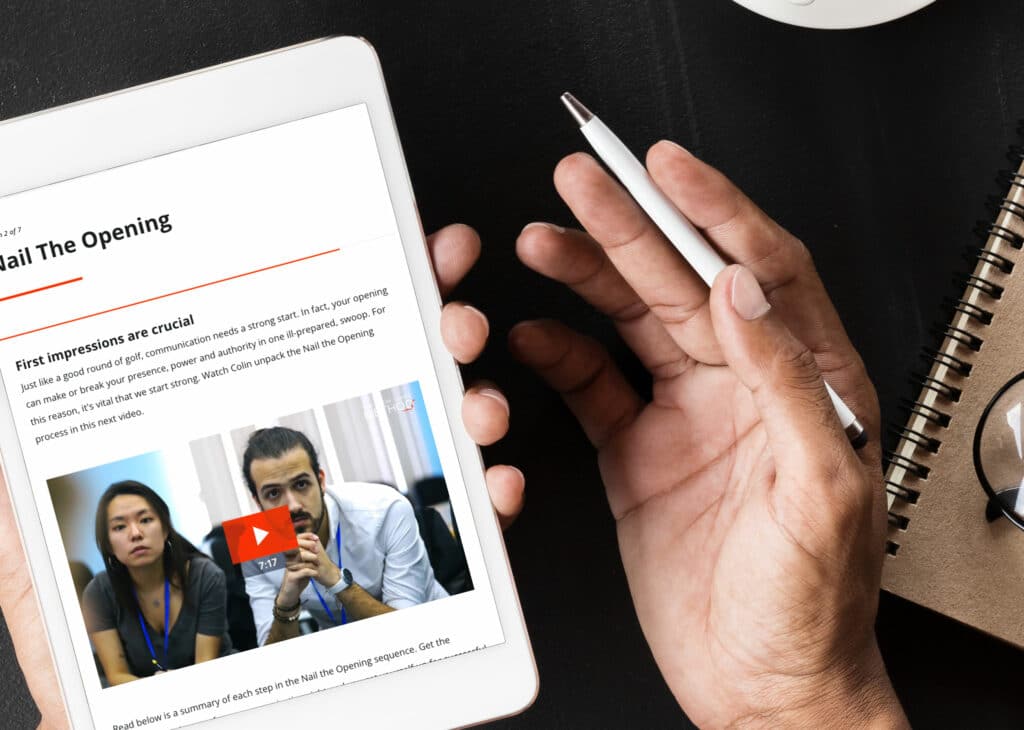Have you ever been in a business presentation and come out of it to realise you haven’t really understood what was said?
This is probably because jargon was peppered throughout the speech making the essence of what was said meaningless to most people in the room. If you work in a company that has a prevalence for corporate jargon, then you may even be guilty of it yourself.
Perhaps you run meetings on a regular basis and wonder why your staff don’t action anything you say, or they often misunderstand your meaning?
A good test to find out if jargon is taking over your world is to talk about your day to a partner or friend and watch their eyes. If they start to glaze over when you mention you’re trying to ‘take it to the next level’ or you’re working to improve the firm’s ‘core competencies’, then it’s a surefire sign that you’re using too much jargon.
The problem with corporate jargon
Why is corporate jargon so bad for a business presentation? Surely throwing a few important-sounding phrases into the mix will make you sound more important?
Unfortunately not.
Corporate jargon, when it comes down to it, is just a bunch of buzzwords that don’t really mean anything.
As executive search consultant, Michael Travis says in this Forbes article, “Aspiring managers would do well to remember that if you can’t express your idea without buzzwords, there may not be an idea there at all.”
It’s a good point to make. If you come out of a meeting from a top level manager with no solid, actionable plan in place, then really it’s just a lot of hot air being spouted into the ether.
Another reason why corporate jargon can be a problem when used in a business presentation is that buzzwords and canned phrases can be confusing if people don’t understand what they mean. It opens up a lot of room for different interpretations, and what people derive from the speech may not be what the presenter was actually meaning.
For example, if you have employees from different cultural backgrounds and who don’t speak English as a first language, then corporate jargon will just be gobbledygook.
As Rafael Rozenson points out in this Telegraph article “The danger of business-speak is that it becomes a substitute for meaningful dialogue and something to fall back on when people don’t know the answer. Instead we need to focus on language that’s clear and actionable.”

Here are some more examples of corporate jargon to watch out for if you’re giving a business presentation:
- we need to ‘move the needle’
- we should adopt ‘lean thinking’
- that’s a great ‘value add’
- that decision is a ‘game changer’
- let’s ‘get everyone on the same page’
- it’s not particularly ‘customer-centric’
- let’s get some ‘low-hanging fruit’ first
- everyone needs to ‘give 110%’
- hire someone who can ‘think outside the box’
- there are ‘lots of moving parts’ on this project.
Removing LY words from your business presentation
Another form of jargon to watch out for in a business presentation is an over-dependence on LY adverbs, words like ‘actually’ ‘totally’ and ‘absolutely’ and so on. LY adverbs are overstatements and killers of elegant communication skills, they don’t allow for subtlety or nuance.
If you listen, a common one you’ll hear people use is ‘actually’ especially if they’re feeling unconfident as it helps give emphatic weight to what they’re saying. But it’s just a filler and it’s not adding value.
Words like this are sloppy additions and by being aware of this in meetings and removing them you can make your language utilisation a lot more elegant, simple and precise.
By using clean, clear language, you’ll find that people will respond to you better, and they’ll be more receptive and more inspired by what you have to say. Best of all they’ll understand the exact message that you’re trying to get across, and there will be no more miscommunications.
So the next time you hear yourself inserting corporate jargon phrases or LY adverbs into a business presentation or at a meeting, stop and think about what you’re saying. It could be a ‘game changer’.
Want to learn more about what NOT to do when presenting to potential customers? Download our 7 Deadly Sins of Pitching cheat sheet today and use our experiences to avoid some common pitfalls
The Colin James Method® coaches and trains executives to improve their professional development with a proven methodology. Our coaches are recognised for their experience in their fields and have worked with many individuals and organisations around the world to master the art of communication.











